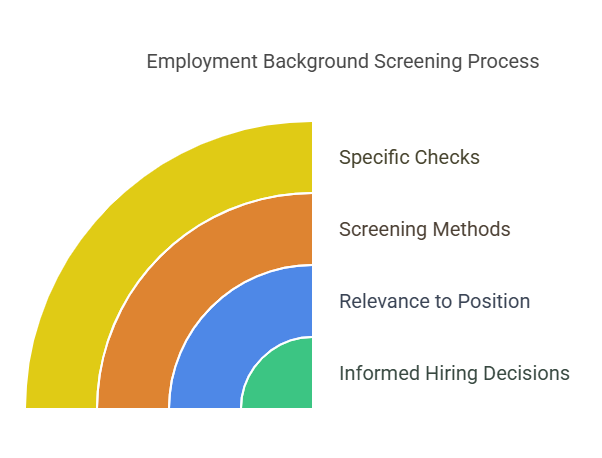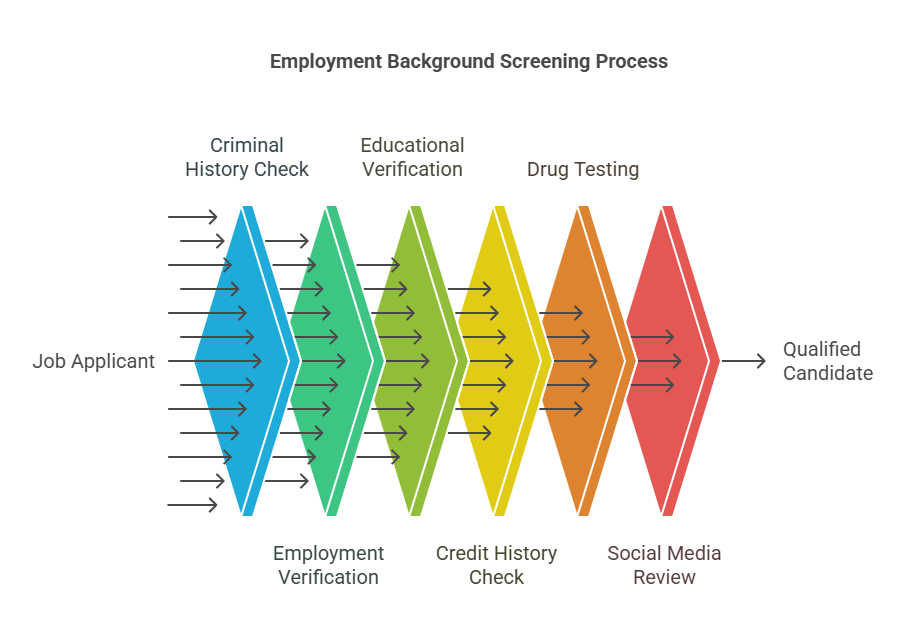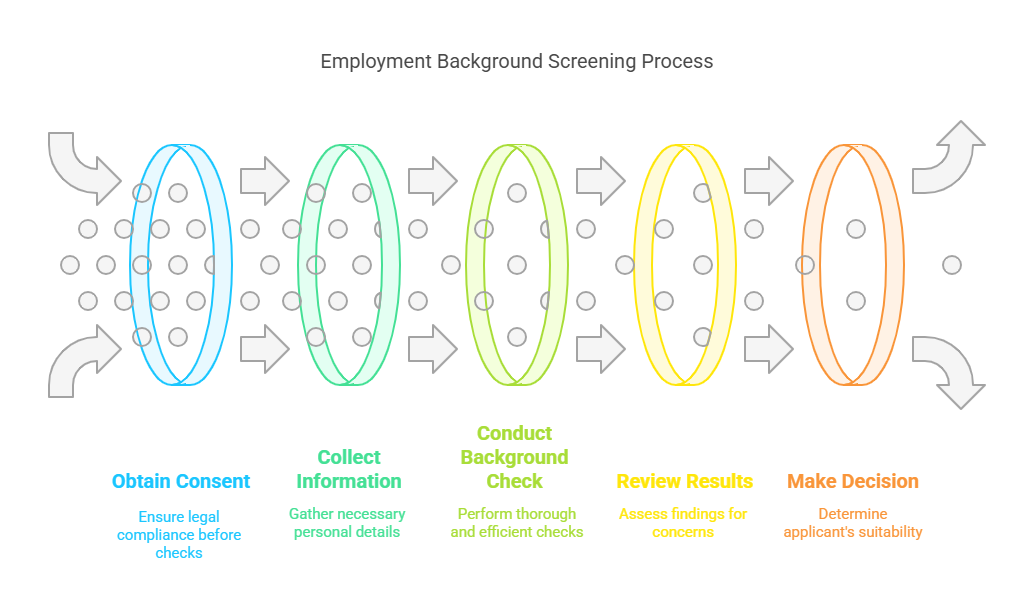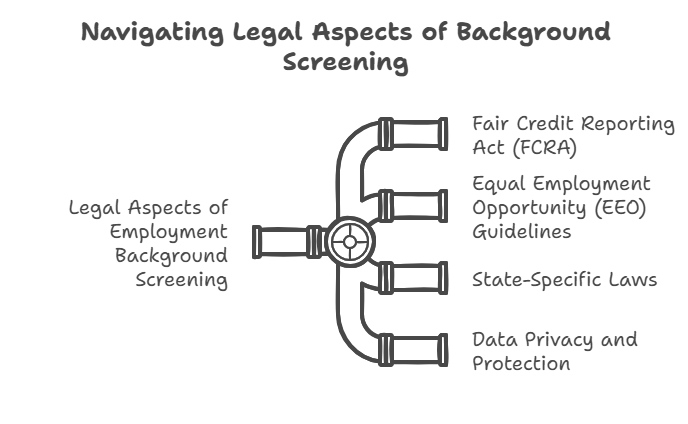How to Conduct Employment Background Screening

Introduction to Employment Background Screening
In today’s competitive job market, the process of hiring new employees is critical for any organization. Employers are not only looking for skills and qualifications but also for individuals who align with their company values and culture. One of the most crucial steps in this hiring process is employment background screening. This comprehensive check ensures that the individuals employers bring on board are trustworthy, qualified, and safe to work with.
What is Employment Background Screening?

Employment background screening refers to the process of verifying a job applicant’s personal, professional, and educational history. The goal is to confirm the accuracy of the information provided by the candidate and to uncover any potential red flags that could affect their suitability for a role. These checks typically include criminal history, credit reports, past employment records, and educational qualifications, but they can also extend to other areas like drug testing or social media background checks.
While background screening is not a one-size-fits-all process, it provides valuable insights that help employers make informed hiring decisions. It is important to note that background checks should always be relevant to the position at hand. For example, a credit check may be necessary for a financial role, but it may be irrelevant for a job that doesn’t deal with financial transactions.
Why is Employment Background Screening Important?
For Employers:
Background checks help employers mitigate the risks associated with hiring new employees. By verifying an applicant’s history, employers can protect their organization from potential legal liabilities, workplace violence, fraud, theft, or other issues that may arise from hiring someone with a problematic background. Background checks also help employers maintain a safe and productive work environment by ensuring they hire individuals who meet the required standards of honesty and integrity.
For Employees:
For job seekers, background screening is equally important. It ensures that employers make objective, fair decisions based on accurate information rather than personal bias. Background checks also help identify and correct any mistakes in an applicant’s history (such as an error in employment records or criminal history). While job applicants may feel anxious about the process, it is essential for both parties to ensure they are being transparent and honest, which helps build trust from the start.
Key Areas Covered in Employment Background Screening

- Criminal History Check
This is one of the most common background checks. It involves searching local, state, and federal databases to determine whether an applicant has a criminal record. Depending on the job, criminal history may be a dealbreaker (e.g., a criminal record may disqualify someone from a position working with vulnerable populations). - Employment History Verification
This background check ensures that the applicant’s work history is legitimate. It involves verifying the positions, dates of employment, job responsibilities, and sometimes performance reviews provided by the applicant. This verification process helps confirm that the candidate has the necessary experience and qualifications for the role. - Educational Qualifications Verification
This check confirms the educational degrees or certifications an applicant claims to have earned. It may include checking with the institutions where the candidate attended school to ensure that the applicant has completed their studies and holds the claimed degrees or diplomas. - Credit History
For positions that involve handling money or access to sensitive financial information, a credit history check may be necessary. This helps employers assess how the applicant manages financial responsibility and whether they may present a risk to the organization due to financial instability. - Drug Testing
Some employers require drug testing as part of their hiring process, particularly for safety-sensitive jobs such as those in the transportation or construction industries. Drug testing ensures a drug-free workplace and reduces the risk of accidents and injuries related to substance abuse. - Social Media and Online Presence
In some cases, employers may review an applicant’s social media accounts or online presence to evaluate their behavior, attitudes, and overall suitability for a company culture. This step should be performed cautiously to avoid infringing on privacy rights or biases.
Compliance with Laws and Regulations
Employment background screening is governed by various laws and regulations to ensure fair treatment of job applicants. Some of the most important regulations include:
- The Fair Credit Reporting Act (FCRA): This federal law governs the use of consumer information, including background checks, for employment purposes. It requires employers to obtain written consent from the applicant before conducting a background check and to notify the candidate if they plan to take adverse action based on the results.
- Equal Employment Opportunity (EEO) Guidelines: Employers must comply with EEO laws to avoid discrimination in the hiring process. Background checks must be applied consistently to all candidates, and employers must ensure that they are not unfairly excluding individuals based on race, religion, gender, or other protected characteristics.
- Ban-the-Box Laws: In many states and localities, ban-the-box laws prevent employers from asking about criminal history early in the hiring process (often on the initial application form). These laws are designed to give individuals with criminal records a fair chance at employment, allowing them to be evaluated based on their qualifications rather than their past.
Employers need to stay informed about these regulations to ensure they conduct background checks in a legal and ethical manner. Failure to comply with these laws can result in penalties, lawsuits, and damage to an organization’s reputation.
Exploring the Different Types of Employment Background Checks and the Screening Process
Once a company decides to implement an employment background screening process, the next step is to determine which types of checks are appropriate for the position being filled. Understanding the different types of background checks and how they are conducted is crucial for both employers and applicants. This section will explore the most common types of background checks and the steps involved in the screening process.
Types of Employment Background Checks
- Criminal Record Checks A criminal record check is one of the most widely used types of background checks. It involves checking an individual’s criminal history across various jurisdictions, including federal, state, and county-level databases. Criminal record checks are often required for positions involving high security, public trust, or access to sensitive information.
- Employment History Verification Verifying a candidate’s previous work history is essential to confirm their experience and qualifications. This check includes contacting past employers to verify job titles, dates of employment, and sometimes specific responsibilities or achievements. It ensures that the applicant has the required experience for the job they are applying for and helps prevent any misrepresentations on their resume.
- Education Verification Education verification ensures that the academic credentials a candidate claims are legitimate. This may involve contacting educational institutions to confirm degrees, certifications, and the dates attended. This check is especially important for positions that require specific academic qualifications.
- Credit Report Check For positions where employees are trusted with financial responsibilities, employers may conduct a credit report check. This involves assessing the applicant’s credit history, looking for signs of financial irresponsibility, such as bankruptcies, unpaid debts, or high levels of debt. Employers may be particularly concerned about candidates applying for roles in finance, accounting, or management.
- Drug Testing Drug testing is common in industries where safety is a concern, such as transportation, manufacturing, or construction. Drug testing helps employers ensure that potential employees are free from illegal substances that could impair their judgment or performance on the job.
- Social Media Screening In the digital age, many employers are now looking at social media profiles as part of the background check process. This can help them assess how a candidate behaves online, ensuring they align with the company’s values and culture. Social media screening may involve checking platforms like LinkedIn, Facebook, or Twitter for inappropriate content, offensive behavior, or posts that could reflect poorly on the company.
The Screening Process

The employment background screening process generally follows several steps, which can be summarized as follows:
- Requesting Consent
Before conducting any background checks, employers must obtain written consent from the job applicant. This is an important step to ensure compliance with the FCRA and other relevant laws. - Collecting Information
Employers will gather the necessary personal information from the candidate, such as their full name, address, date of birth, and social security number. This information is used to conduct the relevant checks. - Conducting the Check
Once consent is obtained and the required information is collected, the background check begins. Depending on the type of check being conducted, this process can take anywhere from a few hours to several days. Third-party services like Precise Hire are often used to handle this process, ensuring that the checks are thorough, efficient, and compliant with all regulations. - Reviewing the Results
After the checks are completed, the results are provided to the employer. The employer will then review the information to determine if there are any concerns that would affect the hiring decision. This may involve assessing whether a criminal record is relevant to the job or whether a poor credit history indicates financial irresponsibility. - Making the Decision
Once the background check results are reviewed, the employer can make an informed decision regarding the applicant’s suitability for the position. If the background check reveals any red flags, the employer may decide to proceed with another candidate. - Notifying the Candidate
If an adverse decision is made based on the results of the background check (e.g., rejection due to a criminal record or credit issues), the employer must notify the candidate of the decision and provide them with a copy of the report, as required by the FCRA.
Challenges in Employment Background Screening
While background checks are critical, they come with challenges that employers need to be aware of:
- False Positives: Sometimes, a background check may return inaccurate or incomplete results, leading to false positives. For example, an applicant may have a common name that matches someone with a criminal history, causing confusion. It is essential to verify details before making a final decision.
- Delays: Depending on the type of check and the jurisdictions involved, background checks can take time. Employers should plan ahead and set realistic expectations regarding the timeline.
- Privacy Concerns: Employers must be cautious about how they handle personal information. Improper use or sharing of background check data could lead to legal issues.
How Precise Hire Can Help
Precise Hire offers a comprehensive background screening service that helps employers streamline the hiring process while ensuring compliance with relevant laws and regulations. Their platform provides a quick, reliable, and secure way to conduct background checks and employment verifications, allowing employers to focus on selecting the right candidate for the role. By partnering with a trusted service like Precise Hire, employers can mitigate risks and avoid costly mistakes in their hiring processes.
Legal Aspects of Employment Background Screening

Employment background screening is subject to a variety of federal, state, and local regulations designed to protect job applicants’ rights. Employers must ensure they follow these laws closely to avoid legal repercussions. Here are some of the most significant legal aspects related to background screening:
1. Fair Credit Reporting Act (FCRA)
The Fair Credit Reporting Act (FCRA) is a federal law that governs how background checks are conducted, especially when using third-party background screening companies. The FCRA applies to checks that involve consumer reports, including criminal records, credit reports, and other public records.
Key provisions of the FCRA include:
- Consent Requirement: Employers must obtain written consent from the applicant before conducting a background check. This consent must be clearly provided and cannot be hidden in other documents (such as an employment application).
- Disclosure: If an employer intends to take an adverse action (such as not hiring the applicant) based on the information from a background check, they must notify the applicant and provide them with a copy of the report. This ensures that candidates have a chance to dispute any errors.
- Adverse Action Process: The FCRA outlines a specific process for employers to follow if they decide not to hire someone based on the results of a background check. The process includes providing the candidate with the report, a notice of the adverse decision, and the opportunity to address any discrepancies.
2. Equal Employment Opportunity (EEO) Guidelines
The Equal Employment Opportunity Commission (EEOC) enforces federal laws prohibiting discrimination in hiring based on race, color, religion, sex, national origin, disability, or age. Employers must ensure that their background checks do not disproportionately impact certain groups of people, such as minorities or individuals from specific ethnic backgrounds, as this could lead to a discrimination lawsuit.
Some key points to consider regarding EEO guidelines:
- Consistency: Employers should apply background checks consistently to all candidates to avoid discriminatory practices. They should not use criminal history or other factors as a blanket exclusion unless they are directly related to the job position.
- Ban-the-Box Laws: Several states and localities have enacted ban-the-box laws that prohibit employers from asking about criminal history on job applications. These laws are designed to give people with criminal records a fair chance to be considered for jobs. Employers are allowed to conduct background checks later in the process but cannot use the results to automatically disqualify a candidate based solely on their past.
3. State-Specific Laws
In addition to federal regulations, many states have enacted their own laws governing employment background checks. These laws may impose additional restrictions, such as limiting the types of convictions that can be considered for employment or specifying time limits for how far back an employer can look into criminal history.
For example, some states may require employers to consider the nature of the crime, the time elapsed since the conviction, and the relevance of the crime to the job. Employers should familiarize themselves with the laws in their state to ensure compliance.
4. Data Privacy and Protection
Employers must take steps to protect the privacy of job applicants and candidates during the background screening process. The information gathered during a background check is often sensitive, and mishandling or unauthorized disclosure of this data can lead to legal issues.
Employers should implement strict data protection protocols, including:
- Securing background check data to prevent unauthorized access.
- Ensuring that only authorized personnel have access to background check results.
- Complying with the General Data Protection Regulation (GDPR) (for companies operating in or hiring from the European Union).
Frequently Asked Questions (FAQs) About Employment Background Screening
Here are five common questions related to employment background screening and their detailed answers:
Can an employer conduct a background check without my consent?
No, an employer cannot conduct a background check without your explicit written consent. The Fair Credit Reporting Act (FCRA) requires employers to obtain written consent before performing any background check. If you are applying for a job, the employer should provide a separate consent form for you to sign.
Can an employer reject my application based on a criminal record?
It depends on the nature of the job and the criminal record. While employers are allowed to consider criminal history, they must do so carefully and fairly. For instance, a conviction for a crime unrelated to the job may not justify disqualification. Additionally, some states and localities have "ban-the-box" laws that limit when employers can inquire about criminal history. Employers must also follow EEOC guidelines to avoid discrimination based on race or other protected characteristics.
How far back can an employer look into my criminal history?
The length of time an employer can look into an applicant’s criminal history depends on both state laws and the type of job. For example, the FCRA allows employers to report criminal convictions for up to seven years in most cases, but some states restrict how far back an employer can go (e.g., limiting checks to the past five years). However, certain offenses, such as convictions for serious crimes like murder, can be reported indefinitely.
What if there’s a mistake in my background check?
If you believe there is an error in your background check, you are entitled to dispute it. Under the FCRA, you have the right to request a copy of the background report and challenge any inaccuracies. If an error is found, the reporting agency must correct it and provide you with an updated report. You can also notify the employer to reconsider their decision based on the corrected information.
What happens if I refuse to consent to a background check?
If you refuse to consent to a background check, the employer may decide not to proceed with your application. Most employers require background checks as part of their hiring process, and refusal to consent typically means that your application will not be processed further. However, you are not legally obligated to consent, but it could reduce your chances of being hired.
Can an employer conduct a background check without my consent?
No, an employer cannot conduct a background check without your explicit written consent. The Fair Credit Reporting Act (FCRA) requires employers to obtain written consent before performing any background check. If you are applying for a job, the employer should provide a separate consent form for you to sign.
Can an employer reject my application based on a criminal record?
It depends on the nature of the job and the criminal record. While employers are allowed to consider criminal history, they must do so carefully and fairly. For instance, a conviction for a crime unrelated to the job may not justify disqualification. Additionally, some states and localities have "ban-the-box" laws that limit when employers can inquire about criminal history. Employers must also follow EEOC guidelines to avoid discrimination based on race or other protected characteristics.
How far back can an employer look into my criminal history?
The length of time an employer can look into an applicant’s criminal history depends on both state laws and the type of job. For example, the FCRA allows employers to report criminal convictions for up to seven years in most cases, but some states restrict how far back an employer can go (e.g., limiting checks to the past five years). However, certain offenses, such as convictions for serious crimes like murder, can be reported indefinitely.
What if there’s a mistake in my background check?
If you believe there is an error in your background check, you are entitled to dispute it. Under the FCRA, you have the right to request a copy of the background report and challenge any inaccuracies. If an error is found, the reporting agency must correct it and provide you with an updated report. You can also notify the employer to reconsider their decision based on the corrected information.
What happens if I refuse to consent to a background check?
If you refuse to consent to a background check, the employer may decide not to proceed with your application. Most employers require background checks as part of their hiring process, and refusal to consent typically means that your application will not be processed further. However, you are not legally obligated to consent, but it could reduce your chances of being hired.
Conclusion: Key Takeaways on Employment Background Screening
Employment background screening is an essential part of the hiring process for both employers and job seekers. By conducting thorough background checks, employers can mitigate risks, ensure a safer work environment, and make more informed hiring decisions. For job seekers, background checks provide transparency and the opportunity to correct any errors or discrepancies in their history.
Throughout this article, we have explored the different types of background checks, the steps involved in the screening process, the legal aspects, and some frequently asked questions. Employers must remain compliant with federal and state regulations, such as the Fair Credit Reporting Act (FCRA) and Equal Employment Opportunity (EEO) guidelines, to avoid legal issues and ensure fair treatment of candidates.
By working with trusted third-party services like Precise Hire, employers can streamline the screening process, improve efficiency, and remain compliant with all relevant laws. It is also essential for employers to be transparent with candidates, obtain their consent, and provide them with an opportunity to address any issues before making hiring decisions.
Ultimately, proper background screening not only protects employers but also ensures job seekers have a fair chance to prove their qualifications, contributing to a more trustworthy and transparent workforce.
